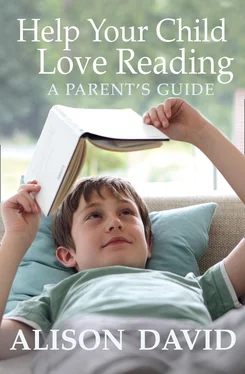EXPERT VIEW
Gaming produces a burst of the brain’s reward chemical dopamine, a substance implicated in all addictions. Interestingly, although ‘computer game addiction’ is being increasingly recognised by the medical profession, they do not recognise ‘book addiction’. And while health departments now recommend limits on children’s screen time, curiously they’re not recommending a limit on reading time or number of books kept in the child’s bookcase. There are a growing number of in-patient clinics for computer addiction, yet there are no Roald Dahl rehab clinics. This is because reading is a very different and more timely neurological and intellectual process, requiring far more inference and cognitive work on the part of the developing child.
Dr Aric Sigman
And gaming and texting only really need short bursts of concentration. Reading requires effort and attention to make sense of the text and follow the story. In other words, it requires sustained concentration.
So not only is it less effort to passively absorb TV programmes, watch videos and to play computer games, but also the rewards come quicker. And the more children do these things, the more their brains become accustomed to them, the more they want and expect that kind of entertainment, and the harder it is for them to concentrate for a longer period of time on something like reading without being distracted.
EXPERT VIEW
The moving image of screen entertainment is the perfect medium to produce strong rewards for paying attention to something. Compared to the pace with which real life unfolds and is experienced by young children, screen entertainment portrays life with the fast-forward button fully pressed. Rapidly changing images, scenery and events – zooms, pans and edits – and high-fidelity sounds are highly stimulating and, of course, extremely interesting. Once you are used to food with E numbers and flavour enhancers, real food doesn’t taste as interesting. Modern screen entertainment is the flavour enhancer of the audio-visual world, providing unnatural levels of sensory stimulation. Nothing in real life is comparable to this. Screen entertainment overpays the young child to pay attention to it, and in so doing it may corrupt the reward system that enables that child to pay attention to other things in life, such as books.
Dr Aric Sigman
There is no doubt in my mind that the desire for screen time can be compulsive. It can also become obsessive, and I think it’s not too strong to say that then it is like a drug. In the worst cases, studies have shown that the changes addiction makes to the brain of an internet addict are similar to those of a drug or alcohol addict: X-rays reveal that pathways to the parts of the brain associated with emotions, decision-making and self-control are interrupted. So these addicts might present as being unable to connect emotionally outside a video game, for instance. At the time of writing it’s estimated that 5–10 per cent of internet users are unable to control their usage and are considered addicts. These numbers are small and the point I make is extreme, but the power of screen-based entertainment to hook us is abundantly clear in our daily lives. And other studies have found a significant link between excessive social networking usage and depression.
As a parent ,I know you’ll have seen the big negative impact – physically, mentally and emotionally – that excessive screen time can have on your child. All the families I have talked to, without exception, have observed changes in their children’s behaviour after too much screen time, whether it be TV, gaming or texting. These changes range from being mildly obsessive, over-excited or lacking in concentration on other things, through to being moody, bad-tempered, hyperactive or even outright aggressive when told it’s time to switch off the machine.
Children can get fixated when trying to get past the next level in a game, checking social media updates, replying to texts or watching the next instalment of something on YouTube. Like addicts they can lose interest in other things as a result. Think about your own need to keep checking emails or your phone for texts. How hard do you find it to switch off and be still, to concentrate on reading? I know how hard it is for me. It’s the same, if not worse, for children.
EXPERT VIEW
Children are understandably influenced by sensation-seeking and instant gratification without their impulse control being fully developed, and so their ability to self-regulate their own screen time is extremely limited.
Dr Aric Sigman
How screens are used for entertainment in the home is therefore a vital element in your child’s reading development. If you want your child to read for pleasure, you’ll need to give the whole issue a lot of thought, not only considering the negative aspects of digital entertainment, the internet and computers, but also the positive ones.
He plays on his Xbox before breakfast, after breakfast and after school. We’d like him to focus his energies into other things but it’s like fighting a losing battle.
Parents to Jordan, age 12
Reading for pleasure and recreational screen time can coexist. I have met families where reading thrives despite all the distractions on offer, and you’ll be pleased to know it’s not that difficult to achieve, although it does require some determination. If you want your child to read for pleasure you have to limit screen time, both to make space and time for reading and to help your child to focus and concentrate on enjoying a good story.
If there are no rules in place to control the amount of screen time, reading for pleasure will definitely suffer because children won’t have the interest, time, patience or attention span to read a book.
I sometimes think the principles of helping your child read for pleasure are like raising a healthy eater – we realise if we want a healthy-eating child we have to supply the good stuff, encourage them to try new things, offer a range of foods and restrict the bad stuff. We don’t let them eat chocolate until they are sick, or drink Coke until they are ill, but we do let them have sweets from time to time. Raising a reader and managing screen time is the same.
 Finding a balance
Finding a balance
The really important point is that it’s not about denying children screen time but it is about being clear on what is allowed. It’s about finding a balance. Your child needs to know screen time is a treat or a privilege, but not their right to use as they wish. Children don’t know what is best for them, and left without rules they won’t turn off the TV, Xbox or Wii because, as I said before, they do not self-regulate. Screen time will take over if children are free to choose.
I think my nephew thinks all mobile phones are his by rights! As soon as I go through the front door he says ‘Can I have your phone?’ before he even says hello to me. Apparently he says this to all the adults he meets. I know his mum has regular dramas of having to physically wrestle with him to get her phone back. He’s only 3!
Angela, aunt to Lukas
It’s certainly made harder to find balance by the sheer number of devices a child typically has access to. I talked to a dad who likened restricting screen time for his children to holding back a tsunami. He told me that at home they have Sky TV, a PC, a laptop, mobiles, a Nintendo DS, a Wii and an Xbox, and the children are constantly badgering for time on screen, be it playing games or using social media to talk to friends. And technology is developing so fast. If you have a young baby now as well as an older child, you will be aware of the huge difference in the digital entertainment available to your baby. One mum I talked to told me she could see a massive increase between her 15 month old’s gadgets and pre-school apps and what her 8 year old had access to at that age.
Читать дальше

 Finding a balance
Finding a balance










